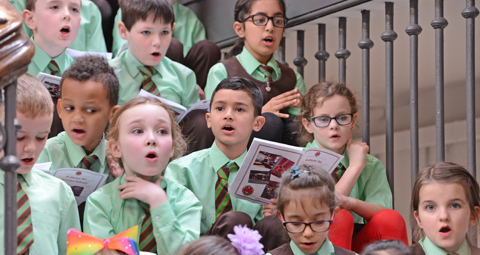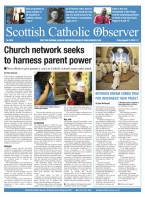June 21 | ![]() 0 COMMENTS
0 COMMENTS ![]() print
print

Catholic education is the jewel in the Church’s crown
Archbishop Philip Tartaglia of Glasgow rejects tired arguments in the media over Catholic schools.
In the first week of June, I attended the World Congress of Catholic Schools at Fordham University, New York, on behalf of the Bishops’ Conference as part of the our Scottish Catholic Education Service delegation. It was a first for me both at such a conference and as a visitor to the Big Apple.
The Congress was the brainchild of the International Office for Catholic Education (OIEC), affiliated to the Holy See’s Congregation for Catholic Education, which was represented at the congress by senior officials.
Indeed, Archbishop Angelo Vincenzo Zani, the secretary of the congregation, convoked a meeting of the 15 bishops from around the world who were present at the congress.
Multicultural
The congress was truly international, with the participation of around 2,000 delegates. An indication of the international flavour of the congress was that the daily congress Mass was celebrated in English, Spanish and French on successive days.
The unifying theme of the congress was based on Pope Francis’ encyclical Laudato Sí’ on the care of God’s creation as our common home.
This theme sparked some interesting and creative reflections on how Catholic education could and should incorporate a sense of wonder and responsibility for the earth, not simply as a response to a local authority educational directive, but on the basis of our Faith in Jesus Christ, which gives us a far richer vision of creation and a far greater motivation for caring for the natural world.
Common themes
It was interesting to note the commonality of themes that emerged across the spectrum of Catholic schooling throughout the world:
- How to maintain and develop the identity of Catholic schools in a new world
- How to provide teachers with the necessary formation to support the project of Catholic schools, especially when there are fewer priests and Religious in Catholic schooling
- How the mission of the Catholic school can be taken forward with a more diverse pupil cohort
- How to develop the ‘educational community’ of teachers and pupils, family, parish and local community
- How to engage positively and sanely with the new challenges emerging from the culture of equality and inclusion.
SCES
I was glad that, here in Scotland, with the visionary and diligent work of our Scottish Catholic Education Service (SCES), we have been engaging with that agenda for some time now. These are the challenges for Catholic schools that we will be facing well into the future.
The Catholic community in Scotland should be glad to know that we are as far ahead of the game in these challenges as anyone is, and we are in a position to share our good practice with others.
I particularly enjoyed a short and inspiring address by a lecturer at Notre Dame University who works on the formation of Catholic teachers.
Discipleship
He said that Catholic teachers needed to love children, be the best educators they can be, and live their professional lives as teachers as a profound expression of their discipleship. I could not have put it better myself!
I was struck, finally, by a statistic that was presented at the congress. Catholic schools around the world educate some 63 million children and young people. This makes the Catholic Church the largest provider of schooling in the world apart from the governments of China and India!
Tiresome objections
It occurred to me that such a project of Catholic education makes some of the objections to Catholic schools that are trotted out in our media and in some political circles with predictable and tiresome regularity sound downright small-minded and bigoted.
The Catholic community of Scotland should take heart that Catholic schools are part of a worldwide and hugely appreciated project of education of children and young people.
I have always said that Catholic schools are the jewel in the crown of the Catholic Church in Scotland, and we need to let that jewel sparkle ever more brightly. Praise of our Catholic schools is richly deserved.










